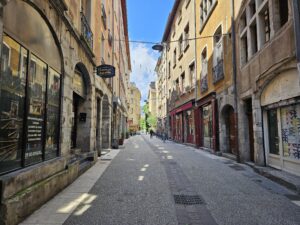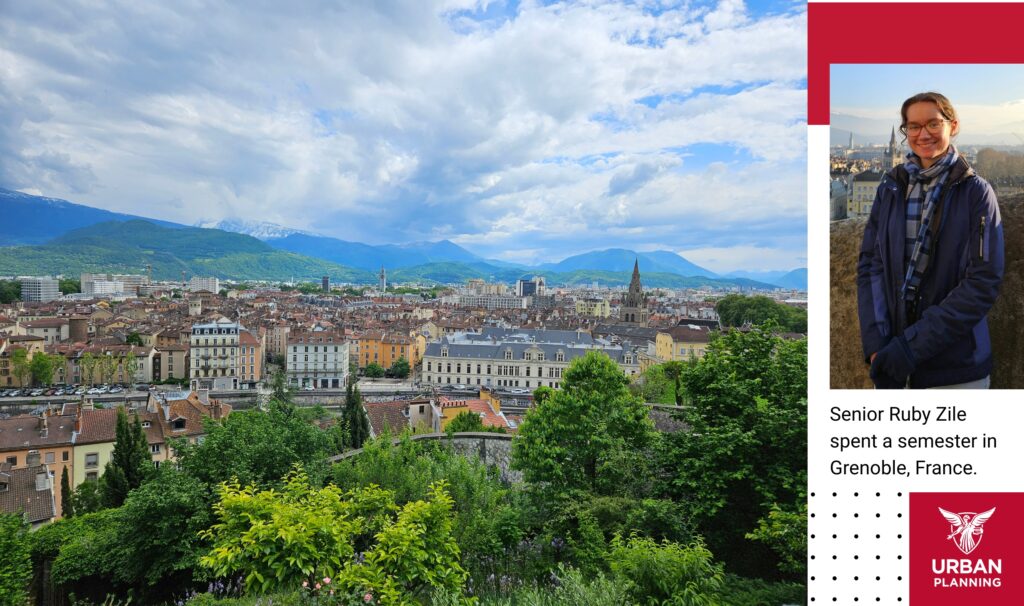By Ruby Zile, BUPD 2026
I knew when I started school at Ball State that I wanted to study abroad. I had taken French for four years in high school, and one summer, I had the opportunity to spend five weeks in France through IU’s Honors Program in Foreign Languages. I promised to speak no English throughout my stay. It was crazy to me how quickly my brain switched to thinking in French despite how little I knew. I learned more in those five weeks than I did in four years in class. My sophomore year, I applied for a semester at the University of Montreal in Canada, but it didn’t work out. Then, I scheduled a one-on-one advising session with the Rinker Center, and that’s when I found AIFS. It had everything that I wanted: flexibility in program options, homestay options, scholarships, courses through a host university. I was a little afraid to go abroad for an entire semester, but the French professors at Ball State encouraged me and helped me with every step. I’m not sure I would have done it without their help.
Studying abroad in Grenoble, France, last spring not only helped my language acquisition, but it helped me connect more with my own history. The more I learned about French culture, the more I could clearly see what made it different from American culture. I could see more clearly where those differences come from, and it made me realize how much cultural differences shape city planning.
As an urban planning major, I knew that we Americans center our city planning around the car, and that, by contrast, many European cities are much more walkable. However, I didn’t expect living in a walkable city to really feel so different.
Located in the Alps near where France, Italy, and Switzerland meet, Grenoble is a midsized French city of 156,389 people (French INSEE 2022 data). Although its population isn’t that large, walking through the streets felt like I could get lost exploring. Every street downtown and many streets in the suburbs were filled with local coffee shops and stores. There were several parks and plazas primed for people watching. As soon as the weather was nice, these spaces filled with people enjoying the sun. I attribute this to the importance the French place on taking breaks.
 Once a week, I would have a four-hour class at the university and, without fail, about two hours in, we got a 20-minute break. Our professor told us at the beginning of the semester that we “had the right” to this 20-minute break. On one of my exam days, I had two exams back-to-back, spanning four hours. Although I assured them that I was all right, when the proctors realized my schedule, they told me I must take a 10-minute break, to “go get a coffee” or do something. This value of taking breaks gives people the time to frequent those coffee shops and stores lining the streets or to sit outside in the plazas and parks.
Once a week, I would have a four-hour class at the university and, without fail, about two hours in, we got a 20-minute break. Our professor told us at the beginning of the semester that we “had the right” to this 20-minute break. On one of my exam days, I had two exams back-to-back, spanning four hours. Although I assured them that I was all right, when the proctors realized my schedule, they told me I must take a 10-minute break, to “go get a coffee” or do something. This value of taking breaks gives people the time to frequent those coffee shops and stores lining the streets or to sit outside in the plazas and parks.
Grenoble is a city rich with history. A former Roman city, it is the birthplace of the French Revolution. About a year before the storming of the Bastille in 1789, the Journée des Tuiles took place in Grenoble on June 7, 1788. Soldiers were sent into Grenoble to quell the growing unrest. The townspeople rioted, and many of them went onto the rooftops and tore off roof tiles to throw onto the soldiers below. The Grenoblois are very proud of their history and, like many of the French, believe strongly in the right to protest. Several times throughout the semester, protesters would march along the tram tracks, shutting down tram lines for the day. No one seemed phased by these disturbances in their transportation. They simply took a bus or walked instead.
While in Grenoble, I lived with a host family and took classes at the Université de Grenoble Alpes through their Centre Universitaire d’Études Françaises program. My classmates were French language learners from all over the world with the goal of passing the B2 Intermediate French exam at the end of the semester. Because my class had tested into the middle of the B2 level, our professor warned us that many students have to take the exam a second time to pass. I studied harder than I ever have before, and, in June, I learned that I passed with the second level of honors: “mention bien”. (Mention, as I understand it, has three levels: mention assez bien, mention bien, and mention très bien.) About a month later, I received my B2 diploma, certifying that I had completed the B2 level and was one step closer to fluency. However, studying abroad did more than help me with my language acquisition: It helped me learn more about who I am and where I come from.
